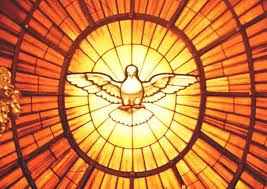On the life of the virtues-more in the series on perfection
I want to apologize to the blogging friends who wanted me to organize all the past postings on perfection. As I am fighting an old computer and off and on Internet, I hope you can wait until I have more peaceful access to both.
The old fashioned teaching which I grew up with and which was taught in the pre-Vatican II Church included the emphasis on the practice of the virtues, which I have mentioned here and do so again today. One of the great misunderstandings of Catholics in the pew is that the avoidance of mortal and venial sins are enough to gain heaven, with a few meritorious acts attached. Not so. The great teaching of the Church includes the idea that the life of the virtues and the manifestation of the gifts of the Holy Spirit must be part of the life of a Catholic in order to gain heaven. Purgatory is exactly that, purgation, and the end of the time in which to develop, practice the virtues. The gifts of the Spirit help us perfect the virtues. When was the last time you heard any teaching from the pulpit on the necessity of the virtuous life? Throughout the ages, many, many spiritual guides have helped us with these ideas, which are not new.
If I can oversimplify the process, it would be like this: first, the introduction of the soul into the life of sanctifying grace, which informs actual grace and gives us, (happens at baptism), the theological virtues of Faith, Hope and Charity; second; the intellect and soul must cooperate with grace in the development of the virtues-the soul needs the intellect and the will to live in the life of sanctifying grace. Third, the virtues must become habits, not merely something we think of doing now and then. Without this practice of the virtues, there is a chance of losing our salvation. We develop adisposition to and in developing the virtues. A person who is in the natural order, without grace, may seem to be practicing natural virtues, but without grace, a person is not actually an heir of God, a co-heir of Christ, and therefore, going to heaven. This is one of the great heresies of our day, the idea that just being good gets one to heaven. Being good may be natural for some people, and the supernatural order of grace, that is directed to our final end, can be ignored. We are united to God by grace.
The development of the life of the virtues is the necessary step. The Indwelling of the Holy Trinity occurs in baptism and confirmation, and some theologians equate the phrase "the Kingdom of God is within" with that mystery the Indwelling of the Holy Trinity. The Holy Spirit gives us gifts, which help us develop the virtues, and then exhibit the gifts of the Spirit. Grace introduces us into the life of the Trinity.
to be continued....
The old fashioned teaching which I grew up with and which was taught in the pre-Vatican II Church included the emphasis on the practice of the virtues, which I have mentioned here and do so again today. One of the great misunderstandings of Catholics in the pew is that the avoidance of mortal and venial sins are enough to gain heaven, with a few meritorious acts attached. Not so. The great teaching of the Church includes the idea that the life of the virtues and the manifestation of the gifts of the Holy Spirit must be part of the life of a Catholic in order to gain heaven. Purgatory is exactly that, purgation, and the end of the time in which to develop, practice the virtues. The gifts of the Spirit help us perfect the virtues. When was the last time you heard any teaching from the pulpit on the necessity of the virtuous life? Throughout the ages, many, many spiritual guides have helped us with these ideas, which are not new.
If I can oversimplify the process, it would be like this: first, the introduction of the soul into the life of sanctifying grace, which informs actual grace and gives us, (happens at baptism), the theological virtues of Faith, Hope and Charity; second; the intellect and soul must cooperate with grace in the development of the virtues-the soul needs the intellect and the will to live in the life of sanctifying grace. Third, the virtues must become habits, not merely something we think of doing now and then. Without this practice of the virtues, there is a chance of losing our salvation. We develop adisposition to and in developing the virtues. A person who is in the natural order, without grace, may seem to be practicing natural virtues, but without grace, a person is not actually an heir of God, a co-heir of Christ, and therefore, going to heaven. This is one of the great heresies of our day, the idea that just being good gets one to heaven. Being good may be natural for some people, and the supernatural order of grace, that is directed to our final end, can be ignored. We are united to God by grace.
The development of the life of the virtues is the necessary step. The Indwelling of the Holy Trinity occurs in baptism and confirmation, and some theologians equate the phrase "the Kingdom of God is within" with that mystery the Indwelling of the Holy Trinity. The Holy Spirit gives us gifts, which help us develop the virtues, and then exhibit the gifts of the Spirit. Grace introduces us into the life of the Trinity.
to be continued....
